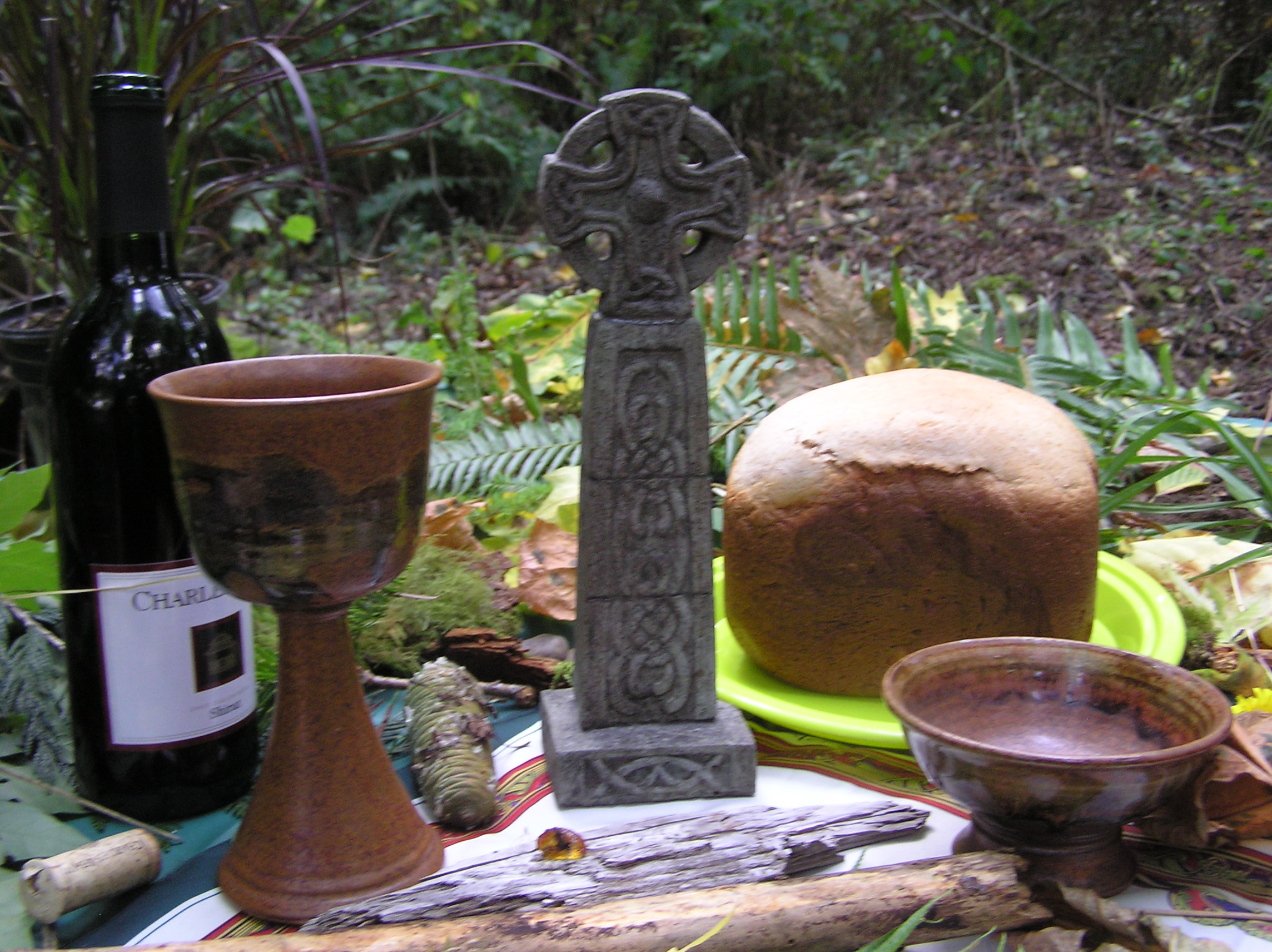Today Tom and I were supposed to go up to Camano Island to begin roofing our first building at the Mustard Seed Village. Things did not go as we expected. We arrived to find the lumber had not been delivered and the lumber yard was closed. Frustrating yes but the day was not wasted. We returned home and I planted pansies and bulbs instead. And now I have just watched one of the most beautiful sunsets I have seen for a long time.
How often I wonder do we miss the breathtaking beauty of God because we are all set on doing the wrong things – wrong at least from God’s perspective. So I hope that you will enjoy this sunset with me and spend some time thinking of the beautiful things you could easily have missed in the last few days if God had not redirected your footsteps.
A friend just commented on Facebook that this reminded them of the song from Garden State Beauty in the Breakdown. And I agree with him it does seem appropriate so I thought I would add it here.
It is St Francis Day and as you can imagine the blogosphere is alive with prayers, reflections and blessings. I am not an expert on St Francis so thought I would leave the descriptions and explanations to those that are, like my friend Jamie Arpin Ricci. I suggest that you read this helpful article The Gospel According to St Francis he wrote a couple of years ago.
Here are some of my favourite St Francis Prayers.
This prayer commonly associated with St Francis was not actually written by him as Daniel Horan explains in Living the Prayer of St Francis With All Creation but is still a good reminder of all he stood for.
Lord, make me an instrument of your peace.
Where there is hatred, let me sow love.
Where there is injury, pardon.
Where there is doubt, faith.
Where there is despair, hope.
Where there is darkness, light.
Where there is sadness, joy.
O Divine Master,
Grant that I may not so much seek to be consoled, as to console;
To be understood, as to understand;
To be loved, as to love.
For it is in giving that we receive.
It is in pardoning that we are pardoned,
And it is in dying that we are born to Eternal Life.
Amen.
Or you may prefer this form to meditate on
I particularly love this rendition written for international women’s day a couple of years ago
A Franciscan Prayer for International Women’s Day
I love this prayer which Micha Jazz posted on the Light for the Journey Facebook page this morning
Prayer for St Francis’ Feast
Francis, the destitute and lowly, enters heaven a rich man, acclaimed by the songs of angels!
Lord God, you made Saint Francis of Assisi
Christ-like in his poverty and humility.
Help us so to walk in his ways that,
with joy and love,
we may follow Christ your Son,
and be united to you.
Through our Lord Jesus Christ, your Son,
who lives and reigns with you and the Holy Spirit,
one God, for ever and ever. Amen.
Francis, the destitute and lowly, enters heaven a rich man, acclaimed by the songs of angels!
And finally a beautiful song/prayer/poem of praise from the Franciscan Friars.
The Praises of God
Lord God:
you alone are holy,
you who work wonders!
You are strong, you are great,
you are the Most High,
you are the almighty King,
you, holy Father, King of heaven and earth.
Lord God: you are Three and you are One,
you are goodness, all goodness,
you are the higest Good,
Lord God, living and true.
You are love and charity, you are wisdom,
you are humility, you are patience,
you are beauty, you are sweetness,
you are sefety, you are rest, you are joy,
you are our hope
and our delight,
you are justice, you are moderation
you are all our wealth
and riches overflowing.
You are beauty, you are gentleness,
you are our shelter, our guard
and our defender,
you are strength, you are refreshment,
you are our hope.
you are our faith.
you are our love,
you are our complete consolation,
you are our life everlasting,
great and wonderful Lord,
all powerful God, merciful Savior!
Amen.
And for those who might like to read more prayers and what I have written in previous years for St Francis day.
Let Us Desire Nothing But God – A Prayer by St Francis of Assisi
A Franciscan Prayer of Blessing
Blessing the Animals – Litanies and other resources

Science in Action Winner for 2013: Elif Bilgin
While sitting in the dentist’s office yesterday I read this wonderful article about a young teen in Istanbul who has developed plastic from banana peels. As a result she won the Scientific American 2013 Science in Action Award
Bilgin spent two years developing a robust bioplastic from discarded banana peels, enduring 10 failed trials along the way. As she noted in her project description: “Even Thomas Edison said, ‘I have not failed. I have just found 10,000 ways that won’t work.’” Bilgin hopes that her material will someday supplant some petroleum-based plastics. Read the entire article.
The winning project in 2012 was the Unique Simplified Hydroponic Method, developed by 14-year-old Sakhiwe Shongwe and Bonkhe Malalela of Swaziland.
For more inspiration, check out last year’s amazing 13 finalists for the Science in Action award and this year’s fifteen finalists. I particularly loved:
Simultaneous Biopesticide Wastewater Treatment and Bioelectricity Generation in Microbial Fuel Cell (MFC) – by a 13 year old in India and Electricity From Traffic by a 16 year old also in India. These ideas really could save the world.
The amazing creativity and out of the box thinking that has gone into these inventions really impressed me. While so much of the world is saying “We can’t live without petroleum products” or “we can’t feed the world without GMO crops” young people are going ahead and inventing new options. Maybe its because they expect to live in a petroleum free world, maybe it is because they are encouraged to be creative, maybe it is just God stirring new possibilities in minds that are open to change. I don’t know but I do praise God for it.
I would love to hear from others who have seen creative and inventive
This morning I am reblogging a post by Gerald Iversen. It first appeared on his blog as Living Fair Trade. Gerald describes himself as the chief activist of Simple Living Works which came out of Alternatives for Simple Living. Simple Living Works has many of Alternatives resources available so don’t just read the post – follow the links! Each year they produce a great resource – Whose Birthday is It Anyway?

Our daughter Elysha gave me a lovely African-style shirt when she served in the Peace Corps in Kenya. I wear it for two reasons. First, as a symbolic gesture to stand in solidarity with our brothers and sisters around the world. Wouldn’t it be great if our church choirs wore clothes like this instead of sterile choir robes? (I was a Minister of Music for 25 years, so I know about sterile choir robes!)
Second, I wear it to promote Fair Trade. You may have heard of Fair Trade coffee and now Fair Trade chocolate. I l-o-v-e dark Fair Trade chocolate.
We practice Fair Trade for two basic reasons. First, to make sure that farmers and artisans in non-industrial countries get a fair price for their goods. And secondly, to EDUCATE US. Through Fair Trade we learn from the world community (Living More with LessLife Standard #2).
Rita and I have gotten involved with Sharing the Dream, a Fair Trade organization based in South Dakota.
We visited Guatemala for ten days a few years back to meet the Mayan artisans. It was a life-changing trip. Now we can tell their stories. Guatemala suffered through a 30-year civil war between the indigenous Mayans and the Ladinos, the descendants of the Spaniards. Many of the Mayan women lost their husbands, so they make beautiful crafts for North Americans, to support their family and send their children to school. (School’s not free in Guatemala.)
We organize several display/sales each fall. We have had considerable success because 1. It’s a good cause, 2. We have a relationship with the sponsoring churches (we’re usually members), 3. We’re assertive. We don’t wait for them to come to us. We work with the church to publicize the event in advance through posters, newsletter, email blasts, pulpit announcements – all which we provide. We make it easy for the church. On the day of the event, if we’re not set up in the narthex, one of us – the “hawker” – stands in the narthex and in friendly way urges people to go into the display area.
Fair Trade is educational. The crafts can be given to children and others. Each comes with a story. They can help us understand another culture.
Testimonial from Debb Lutz
Gerald, You and Rita came to Mifflinville, Pennsylvania, years ago now to speak to a group of my friends. I still strive to impress upon folks the importance of less stuff. I remain the coordinator for our church’s Alternative Gift Fair. This event has encouraged nearly $130K of monetary gifts to 30 different charities in the last nine years. That money could have bought a lot of “stuff” but folks gave it to help others. Thank you for YOUR work in keeping us on the right track. Peace, Debb
Read about our visit at Debb’s church at Travels year 2.5. (Scroll to post #214.)
OCTOBER, Fair Trade Month, aims to raise awareness of the reasons why fair trade is important, and to promote buying and using socially and commercially sustainable, fair trade products in place of commodities which may harm the environment, the economy, communities and disadvantaged individuals.
Fair Trade Resource Network is an information hub designed to grow the fair trade movement. Together, we can create a market that values the people who make the food we eat and the goods we use. Advocacy Resources Offered by Several Organizations & Campaigns
Here’s help with a variety of similar events.
- Alternative Christmas Campaign
- Organizing a Festival
- Planning an Alternative Christmas Workshop
- How to Organize an Alternative Christmas Community Festival
- UNPLUG the Christmas Machine Workshop Leader’s Guide
For encouragement see and read about Micah 6 Action Team I met in the St. Louis area. They organize an annual alternative Christmas church fair. (Scroll to post #109.)
Podcast Reminder
You can access all SLW! podcast audio and the show notes either atSimpleLiving.startlogic.com/SLW-PODCAST or at SimpleLivingWorks.org (then click window #3). Listen through your computer, iPod, iPad, iPhone (or equivalent). SUBSCRIBE through iTunes, Stitcher.com or your favorite podcast service.
Or access individual episodes:
#4: Beyond a Consumer Lifestyle-1
#5: Beyond a Consumer Lifestyle-2
#6: Whose Birthday Is It, Anyway?-1 (of 6)
Do your friends a favor. Share this blog and podcast.
Peace, Gerald ”Jerry” Iversen, Chief SLW! Activist
Food is the physical embodiment of prayer.
I could not help but think of this quote from Soil and Sacrament by Fred Bahnson this morning as I read through various articles about the impact of the decisions in Washington D.C. I feel a little like Pope Francis who during his recent visit to Sardinia, known for its palatial homes but where 51% of young people are unemployed, threw away his prepared speech and decried a global economic system that does so much harm.
I too am throwing away my “prepared speech” this morning, because my heart aches. Here in the U.S. we have gutted food stamps and support to the poor, denied healthcare to the millions who do not have it, frozen the budget and consequently decimated the lives of many low paid government workers who live from day to day . What has happened to our prayers that should be embodied in feeding and caring for those at the margins? What has happened to our compassion for those who cannot make ends meet? Why do we no longer heed God’s words to feed the hungry?
Yes I know some will say that is the church’s responsibility and it is but that is not their’s alone. All of us are responsible and the present financial capitalism which rewards those at the top while everyone else struggles, as Bill Moyers reminds us will consume us and democracy will be finished.
United for a Fair Economy posted this graphic How Do We Coddle the Super Wealthy? yesterday. I find it very sober reading. The super wealthy have convinced us that the poor are the ones who take advantage of the system while they are squeaky clean. And totally disrupting a democratically elected government and president is OK as long as its the poor and not the rich that suffer. OK I know that is my cynical read on the situation and it is not entirely accurate but it flows from a grieving heart this morning and so I hope you will forgive me.
Let me leave you with these powerful words from the book of James to meditate on this morning. It is quoted here from a new bible I received from Thomas Nelson recently entitled Compass: The Study Bible for Navigating Your Life. the translation is The Voice.
Brothers and sisters it doesn’t make any sense to say you have faith and act in a way that denies that faith. Mere talk never gets you very far, and a commitment to Jesus only in words will not save you. It would be like seeing a brother or sister without any clothes out in the cold and begging for food, and saying “Shalom friend, you should get inside where it’s warm and eat something”. but doing nothing about his needs- leaving him cold and alone on the street. What good would your words alone do? The same is true with faith. Without actions, faith is useless. By itself, it’s as good as dead. I know what you are thinking: “OK, you have faith and I have actions. Now let’s see your faith without works and I’ll show you a faith that works. (James 2: 14-17)

St. Francis of Assisi (circa 1182-1220) from Wikimedia Commons.
This coming weekend is the traditional time to bless our animals at church. This Sunday we get to take our Bonnie inside to receive the blessing.
This began as a Catholic celebration associated with St Francis of Assisi, but has become extremely popular for people of many traditions in the last few years. We are discovering more and more the benefits of pets in our lives and society so blessing them at church, in the synagogue or even in our animal oriented institutions, is not just a fun thing to do it is acknowledging their importance to both us and God.
Last year I wrote this post: God bless the animals which reflects on that and highlights some of the organizations that work with animals. I also mentioned the annual blessing of the animals at Woodland park zoo here in Seattle. In 2011, in my post A Blessing for the Animals I highlighted the work of Episcopal Relief and Development and their free resource from which the liturgy I posted was drawn.
Here are some other good resources I have found for litanies on blessing animals.
Letallcreationpraise.org lists several sermons and litany for blessing the animals
St Francis Blessing Liturgy by Rev. Robert Morrison and Rev. Richard J. Fairchild
Meet me at the corner has a good introduction to blessing of the animals for kids.
Ritualwell.org has a beautiful Jewish animal blessing
Even the humane society has published an animal blessing
And from one of my favourite comedy shows of all time –
If you have time make sure to watch this episode from The Vicar of Dibley where she blesses the animals.
This beautiful prayer was posted on Light for the Journey by Micha Jazz this morning – enjoy

Santa Teresa de Avila, pintura vidrio en Convento de Santa Teresa. From from the Wikimedia Commons.
Monday is here and so an appropriate prayer for the week from St Teresa of Avila, the great Carmelite reformer and nurturer of St John of the Cross.
I am Thine, and born for Thee:
What wilt Thou have done with me?
Sov’reign Lord upon Thy throne,
Endless Wisdom, One and Whole,
Goodness that does feed my soul,
Good and great, One God alone:
Vile Thou seest me, yet Thine own,
As I sing my love for Thee.
What wilt Thou have done with me?
Thine I am, for Thou didst make me;
Thine, for Thou alone didst save me;
Thine–Thou couldst endure to have me;
For Thine own didst deign to take me.
Never once didst Thou forsake me.
Ruined were I but for Thee:
What wilt Thou have done with me?
What, O good and loving Lord,
Wilt Thou have this creature do?
This Thy slave, a sinner too,
Waiting till she hears Thy word?
With Thy will in close accord,
Sweetest Love, I come to Thee:
What wilt Thou have done with me?
Take, O Lord, my loving heart:
See, I yield it to Thee whole,
With my body, life and soul
And my nature’s every part.
Sweetest Spouse, my Life Thou art;
I have given myself to Thee:
What wilt Thou have done with me?
Let me live, or let me die;
Give me sickness, give me health;
Give me poverty or wealth;
Let me strive or peaceful lie.
Weakness give or strength supply–
I accept it all of Thee:
What wilt Thou have done with me?
Fame or shame I may be given;
Chasten me or make me glad;
Comfort me or make me sad;
Send me hell or grant me Heaven.
Sun, with veil forever riven,
I have yielded all to Thee:
What wilt Thou have done with me?
Teach me, if Thou wilt, to pray;
If Thou wilt not, make me dry.
Give me love abundantly
Or unfruitful let me stay.
Sov’reign Master, I obey.
Peace I find not save with Thee:
What wilt Thou have done with me?
Give, I pray Thee, wisdom true,
Or remove it all from me;
Plenteous years I fain would see;
Years of drought and leanness too.
Days of light and darkness through,
Send me where Thou’d’st have me be:
What wilt Thou have done with me?
If in ease Thou’lt have me lie,
I accept it for Thy love;
If my constancy Thou’lt prove,
May I suffer till I die.
Tell me, sweetest Love, I cry,
How and when to die for Thee:
What wilt Thou have done with me?
Waste or fruitful land be mine,
Tabor’s joy or Calvary’s Cross.
Job be I, with pain and loss,
John, and on Thy breast recline.
Sterile stock or fruitful vine,
As Thou will’st it, may I be:
What wilt Thou have done with me?
Joseph, captive once in chains,
Rule in Egypt over all.
David, held in cruel thrall,
Soon a crown and kingdom gains.
Jonah suffers direst pains;
Then is cast up from the sea:
What wilt Thou have done with me?
Let me speak or hold my peace,
Rich or barren as Thou wilt;
Let the Law proclaim my guilt
Or the Gospel give release.
Let me joys or pains increase.
All my life I live in Thee:
What wilt Thou have done with me?
I am Thine, and born for Thee:
What wilt Thou have done with me?
Teresa of Avila (1515-1582)
http://spiritualsynergy.blogspot.co.uk/
As an Amazon Associate, I receive a small amount for purchases made through appropriate links.
Thank you for supporting Godspace in this way.
When referencing or quoting Godspace Light, please be sure to include the Author (Christine Sine unless otherwise noted), the Title of the article or resource, the Source link where appropriate, and ©Godspacelight.com. Thank you!








